Project overview
Options for treatment and disposal of kitchen and catering wastes are thus limited, with further restrictions due to the physical nature of the waste. Kitchen waste is typically only 15-20% total solids, and even if collected 'dry' it soon compacts to form almost a slurry: this makes it unattractive for composting, which requires a more stable matrix to allow the passage of air. The requirement of the EU Animal By-products Regulations for reduction of particle size to < 9 mm compounds the problem, as the material becomes even more slurry-like. Collection of mixed green and kitchen wastes is clearly not a sensible option as the entire wastestream then requires processing to the high level demanded by the Regulations. Aerobic composting of green wastes from gardens, parks and cemeteries has been successful, but questions remain concerning economics of scale, and the relative environmental impacts of transporting bulky, wet materials long distances to centralised composting plants with a high degree of process control, versus uncontrolled home composting with its potential for methane release and health impacts.
Research activities
The project included theoretical and experimental work. The theoretical component involved assessment of appropriate scales and technologies for urban bioprocessing plant, based on the methodologies developed for a similar SUE Waste project led by Imperial College on thermal processing of urban waste. This was complemented by research looking specifically at 'best value' and BPEO for green wastes in the Hampshire area. The work took a holistic look at the options for green waste management, including economic and environmental criteria such as energy costs and equivalent CO2 emissions from transport of green wastes and compost products, mechanical pre-treatments, process control, leachate treatment and other factors involved in centralised, community or home composting schemes. The experimental part of the work looked at anaerobic digestion as a technique for management of source-separated kitchen and catering wastes, and at the economic and environmental costs and benefits of composting options including home composting.
Research activities
The project included theoretical and experimental work. The theoretical component involved assessment of appropriate scales and technologies for urban bioprocessing plant, based on the methodologies developed for a similar SUE Waste project led by Imperial College on thermal processing of urban waste. This was complemented by research looking specifically at 'best value' and BPEO for green wastes in the Hampshire area. The work took a holistic look at the options for green waste management, including economic and environmental criteria such as energy costs and equivalent CO2 emissions from transport of green wastes and compost products, mechanical pre-treatments, process control, leachate treatment and other factors involved in centralised, community or home composting schemes. The experimental part of the work looked at anaerobic digestion as a technique for management of source-separated kitchen and catering wastes, and at the economic and environmental costs and benefits of composting options including home composting.
Staff
Lead researchers
Collaborating research institutes, centres and groups
Research outputs
C. Alexander, A. Curran, C. Smaje & I. Williams,
2009, Proceedings of the Institution of Civil Engineers - Waste and Resource Management, 162(3), 141-150
Type: article
S. Maynard, T. Cherrett & B. Waterson,
2009, Proceedings of the Institution of Civil Engineers - Waste and Resource Management, 162(1), 37-43
Type: article
C. Alexander, C. Smaje, R. Timlett & I. Williams,
2009, Proceedings of the Institution of Civil Engineers - Waste and Resource Management, 162(1), 15-28
Type: article
W. Powrie, K. Riley & A. M. Salter,
2009, Proceedings of the Institution of Civil Engineers - Waste and Resource Management, 162(3), 119-127
Type: article
Adrian Hickford, Tom Cherrett & Sarah Maynard,
2009, Proceedings of the Institution of Civil Engineers - Waste and Resource Management, 162(1), 29-36
Type: article
R.E. Timlett & I.D. Williams,
2008, Resources, Conservation and Recycling, 52(4), 622-634
Type: article
M.A. Climenhaga & C.J. Banks,
2008, Water Science & Technology, 57(5), 687-692
DOI: 10.2166/wst.2008.092
Type: article
